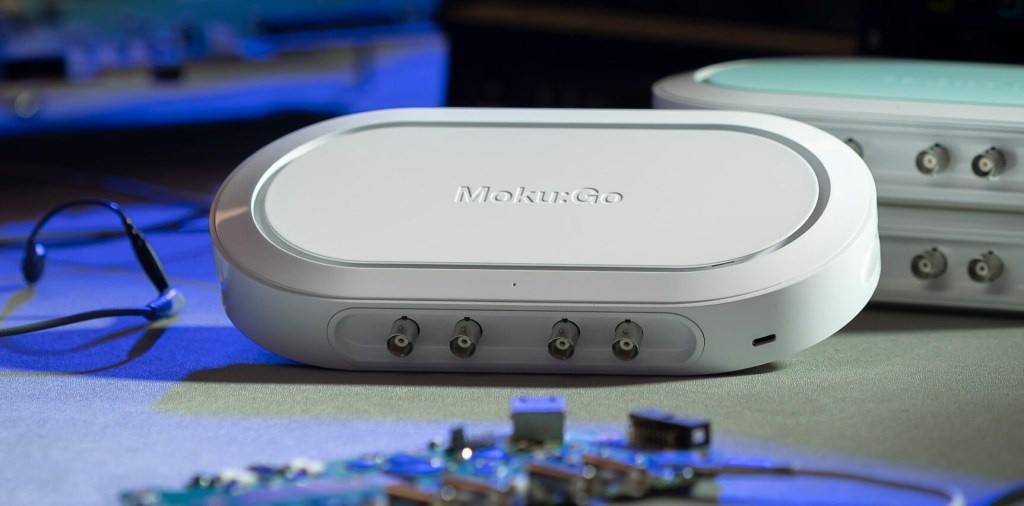Part of learning to be an engineer is understanding the tools you’ll have to work with — voltmeters, spectrum analyzers, things like that. But why use two, or eight for that matter, where one will do? The Moku:Go combines several commonly used tools into one compact package, saving room on your workbench or classroom while also providing a modern, software-configurable interface. Creator Liquid Instruments has just raised $13.7 million to bring this gadget to students and engineers everywhere.

The idea behind Moku:Go is largely the same as the company’s previous product, the Moku:Lab. Using a standard input port, a set of FPGA-based tools perform the same kind of breakdowns and analyses of electrical signals as you would get in a larger or analog device. But being digital saves a lot of space that would normally go toward bulky analog components.
The Go takes this miniaturization further than the Lab, doing many of the same tasks at half the weight and with a few useful extra features. It’s intended for use in education or smaller engineering shops where space is at a premium. Combining eight tools into one is a major coup when your bench is also your desk and your file cabinet.
Those eight tools, by the way, are: waveform generator, arbitrary waveform generator, frequency response analyzer, logic analyzer/pattern generator, oscilloscope/voltmeter, PID controller, spectrum analyzer and data logger. It’s hard to say whether that really adds up to more or less than eight, but it’s definitely a lot to have in a package the size of a hardback book.
You access and configure them using a software interface rather than a bunch of knobs and dials — though let’s be clear, there are good arguments for both. When you’re teaching a bunch of young digital natives, however, a clean point-and-click interface is probably a plus. The UI is actually very attractive; you can see several examples by clicking the instruments on this page, but here’s an example of the waveform generator:

Love those pastels.
The Moku:Go currently works with Macs and Windows but doesn’t have a mobile app yet. It integrates with Python, MATLAB and LabVIEW. Data goes over Wi-Fi.
Compared with the Moku:Lab, it has a few perks. A USB-C port instead of a mini, a magnetic power port, a 16-channel digital I/O, optional power supply of up to four channels and of course it’s half the size and weight. It compromises on a few things — no SD card slot and less bandwidth for its outputs, but if you need the range and precision of the more expensive tool, you probably need a lot of other stuff too.

Since the smaller option also costs $500 to start (“a price comparable to a textbook”… yikes) compared with the big one’s $3,500, there’s major savings involved. And it’s definitely cheaper than buying all those instruments individually.
The Moku:Go is “targeted squarely at university education,” said Liquid Instruments VP of marketing Doug Phillips. “Professors are able to employ the device in the classroom and individuals, such as students and electronic engineering hobbyists, can experiment with it on their own time. Since its launch in March, the most common customer profile has been students purchasing the device at the direction of their university.”
About a hundred professors have signed on to use the device as part of their fall classes, and the company is working with other partners in universities around the world. “There is a real demand for portable, flexible systems that can handle the breadth of four years of curriculum,” Phillips said.
Production starts in June (samples are out to testers), the rigors and costs of which likely prompted the recent round of funding. The $13.7 million comes from existing investors Anzu Partners and ANU Connect Ventures, and new investors F1 Solutions and Moelis Australia’s Growth Capital Fund. It’s a convertible note “in advance of an anticipated Series B round in 2022,” Phillips said. It’s a larger amount than they intended to raise at first, and the note nature of the round is also not standard, but given the difficulties faced by hardware companies over the last year, some irregularities are probably to be expected.
No doubt the expected B round will depend considerably on the success of the Moku:Go’s launch and adoption. But this promising product looks as if it might be a commonplace item in thousands of classrooms a couple years from now.
Edtech stocks are getting hammered but VCs keep writing checks































Comment